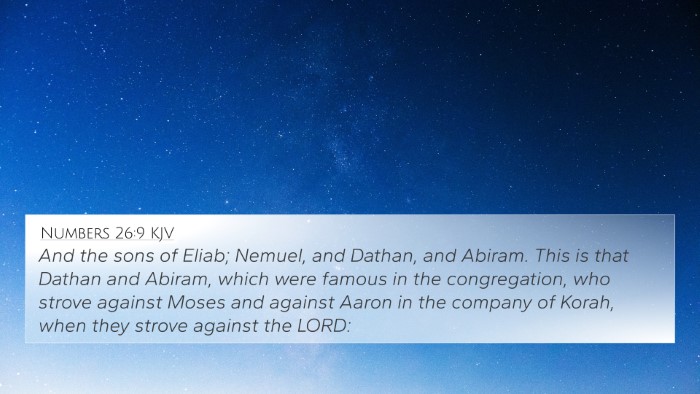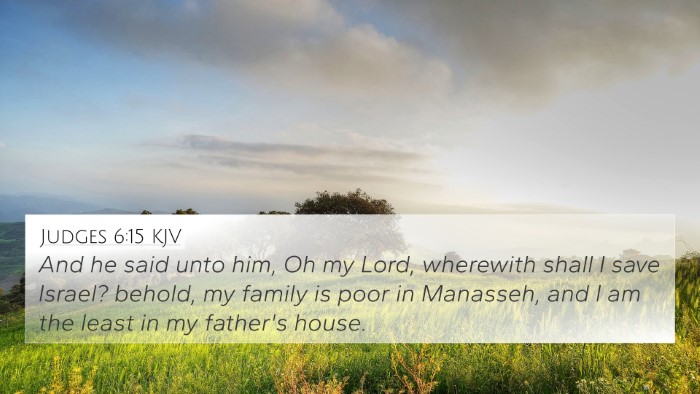Understanding Numbers 1:16
Numbers 1:16 reads, "These are the renowned of the congregation, princes of the tribes of their fathers, heads of the thousands of Israel." This verse identifies the leaders within the community of Israel, highlighting their roles in the congregation. The significance of these leaders is further explored through various commentaries, providing a comprehensive understanding of this verse and its implications.
Summary of Insights
Various public domain commentaries shed light on the meaning of this verse, offering a rich tapestry of insights that help connect it with other scriptures. According to Matthew Henry, this verse underscores the importance of leadership in Israel's community and highlights that such leaders are recognized for their status and responsibility.
Albert Barnes comments that the phrase “renowned of the congregation” points to distinguished individuals whose authority and reputation were paramount in maintaining order and overseeing the people. This is not merely a matter of personal honor but essential for organizational structure within Israel.
Similarly, Adam Clarke emphasizes the need for qualified leaders, interpreting this verse as an indication of God’s desire for order in His people. The heads of the tribes had to possess both divine favor and social respect to guide the Israelites effectively.
Thematic Connections
The verse inherently encourages a thematic exploration of leadership within the Bible. It suggests a divine framework for authority and obedience, which is echoed throughout various scriptures. Below are some Bible cross-references that relate to leadership, organization, and the responsibility of community leaders:
- Exodus 18:21-22 - Moses is advised to appoint leaders over groups of thousands, hundreds, fifties, and tens, reflecting on the need for delegated leadership.
- 1 Peter 5:2-3 - Instructions to elders about shepherding the flock willingly and not for dishonest gain.
- Hebrews 13:17 - Encouragement to obey and submit to your leaders as they watch over your souls.
- Matthew 20:25-28 - Jesus' teaching on leadership being servitude rather than lording over others.
- Judges 2:16 - God appointed judges to save the people from oppression, emphasizing the role of divinely appointed leaders.
- Romans 13:1 - The exhortation of submitting to governing authorities since they are established by God.
- Acts 6:3 - The appointment of deacons to oversee fair distribution among the congregation, demonstrating organizational leadership.
Interconnections and Comparative Analysis
By examining these verses in relation to Numbers 1:16, we can engage in a comparative Bible verse analysis that highlights intersections between different leadership principles throughout the text. The call for organization and the significance of leadership resonate through the narratives in both the Old and New Testaments.
This verse also belongs to a larger dialogue surrounding the nature of community and collective responsibility, leading us to investigate how various Biblical figures, from Moses to the Apostles, functioned within a leadership framework established by God.
Tools for Understanding and Cross-Referencing
Understanding the connections and implications of Bible verses can bolster one’s study of scripture. Utilizing tools for Bible cross-referencing can facilitate deeper comprehension. A reliable Bible concordance or a Bible reference resource can effectively aid believers as they seek to uncover relationships between themes and texts.
With resources such as a Bible cross-reference guide or engaging in cross-referencing Bible study methods, it is possible to identify thematic connections discussed earlier. For instance, examining the relationship between leadership in Numbers 1:16 and other verse contexts can enrich one’s spiritual insights.
Conclusion
In conclusion, Numbers 1:16 casts a spotlight on the critical role of leadership in the faith community of Israel. Through the thematic connections and comparative analysis provided by various commentaries, we see that this verse is not isolated but rather a part of a larger narrative about authority, responsibility, and community structure in the Kingdom of God. Engaging in scriptural cross-referencing unveils the intricate web of connections that enriches our understanding of God's providence through appointed leaders.


















